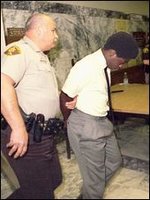 a vigilante gunned down two released sex offenders last august in bellingham, washington. this sunday, joseph l. gray and william elliott were shot to death in maine, apparently by a young canadian man who shot himself when surrounded by officers. once again, the press cites a state sex offender registry as leading the killer to the victims.
a vigilante gunned down two released sex offenders last august in bellingham, washington. this sunday, joseph l. gray and william elliott were shot to death in maine, apparently by a young canadian man who shot himself when surrounded by officers. once again, the press cites a state sex offender registry as leading the killer to the victims.
both mr. gray and mr. elliott were listed on maine’s online registry of convicted sex offenders. one can access the offender’s name, address, date of birth, height, weight, and place of employment, as well as a color photograph. i learned that mr. elliott lived at 953 main street in east corinth, he was last convicted in 2002, served four months in jail, and had been on probation since that time. similar detail was provided for mr. gray, who was last convicted in massachusetts in 1992.
as a i wrote last year, the bellingham murderer sent a hand-written note to the seattle times, detailing his crimes and how he targeted the offenders. here’s what the since-convicted killer wrote on the subject:
“the State of Washington, like many states now lists sexual deviants on the Net. And on most of these sites it shares with us what sexual crimes these men have been caught for, and most are so sick you wonder how they can be free … In closing, we cannot tell the public so-and-so is ‘likely’ going to hurt another child, and here is his address then expect us to sit back and wait to see what child is next”
in a forthcoming article with jeff manza and melissa thompson, i ask whether felons constitute a criminal class, a status group, or a caste (at the time, maine was actually providing less detailed information online than states such as florida). we argue that caste-like relations best apply to hyperstigmatized sex offenders such as mr. gray and mr. elliott.
in my opinion, these murders contribute to the prevailing sense of hopelessness and permanent stigmatization felt by sex offenders, whether serving a life sentence in prison or a spell of probation for a less serious offense. in this regard, i’ve got nothing to add beyond what i wrote last fall:
even years before their scheduled release, both male and female prisoners have told me they feared “the internet” and public availability of information about them. rest assured that the bellingham murder story will quickly make the rounds of every TV room and sex offender unit in state penitentiaries. it is not a story of deterrence that will keep them from future crime. it is not a story of redemption or martyrdom that will give them strength as they work through the tough times. it is instead a story of the hysterical vigilante lying in wait, a story that embodies their fears about life after prison and their dim prospects for ever becoming a normal citizen in a community. and it makes them wonder why the hell they should go to treatment.
do such registries prevent more crime than they cause? who should be listed and for how long? in the name of public safety, dangerous information about many of us could be posted online — is there a compelling rationale for listing sex offenders and not murderers or arsonists or drunken drivers? is there anything in your past that your neighbors ought to know about?
 i’ve just returned from los angeles, where the 2006 american society of criminology meetings will be held. each year the ASC holds its midyear executive board meeting in the conference facilities for the upcoming november meeting. that way, the board can get a taste of the facilities and hammer down meeting details as it does its business.
i’ve just returned from los angeles, where the 2006 american society of criminology meetings will be held. each year the ASC holds its midyear executive board meeting in the conference facilities for the upcoming november meeting. that way, the board can get a taste of the facilities and hammer down meeting details as it does its business.


 chris and i have both written recently about women
chris and i have both written recently about women 